

China in transition: Echoes of Tiananmen. China’s Real Choices for Growth. Yves here.
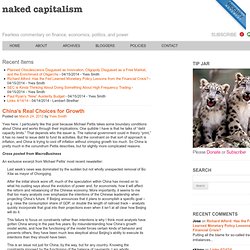
I particularly like this post because Michael Pettis takes some boundary conditions about China and works through their implications. One quibble I have is that he talks of “debt capacity limits.” That depends who the issuer is. The national government could in theory “print,” it has no need to issue debt to fund its activities. But the constraint on that sort of approach is inflation, and China is trying to cool off inflation without crimping growth too much.
Satyajit Das: “All Feasts Must Come to an End” – Fake Goods, Fake Growth? (Part 3) By Satyajit Das, derivatives expert and the author of Extreme Money: The Masters of the Universe and the Cult of Risk Traders, Guns & Money: Knowns and Unknowns in the Dazzling World of Derivatives – Revised Edition (2006 and 2010) Part I; Part II.

A significant part of China’s growth has been an illusion. Since 2008, China’s headline growth of 8-10% has been driven by new lending averaging around 30-40% of GDP. Given that (up to) 20-25% of these loans may prove to be non-performing, amounting to losses of 6-10% of GDP. If these losses are deducted, Chinese growth is much lower. China Wants to Frack, and Frack Hard. While fracking in the US remains a hugely contentious issue, a lack of groundwater regulation combined with an incredible thirst for energy production has led China to push for a massive fracking boom in coming years.
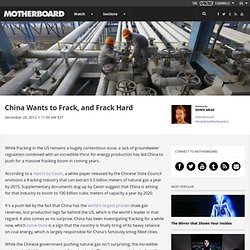
According to a report by Caixin, a white paper released by the Chinese State Council envisions a fracking industry that can extract 6.5 billion meters of natural gas a year by 2015. Supplementary documents dug up by Caixin suggest that China is aiming for that industry to boom to 100 billion cubic meters of capacity a year by 2020. The Canton Fair: The China price. The key to China. To grasp the new spirit of this country, read this fresh, contrarian short fiction “Hiding in the City No. 83” (2009) by artist Liu Bolin.
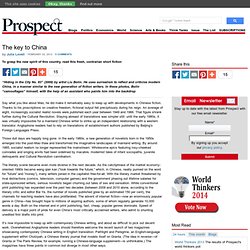
He uses surrealism to reflect and criticise modern China, in a manner similar to the new generation of fiction writers. In these photos, Bolin “camouflages” himself, with the help of an assistant who paints him into the backdrop Say what you like about Mao, he did make it remarkably easy to keep up with developments in Chinese fiction. Thanks to his proscriptions on creative freedom, fictional output fell precipitously during his reign. Those dull days are happily long gone. The literary scene became even more diverse in the next decade. It’s now impossible to keep up with contemporary Chinese writing, and about as difficult to pick out decent work. The Macroeconomics of Chinese kleptocracy. China is a kleptocracy of a scale never seen before in human history.
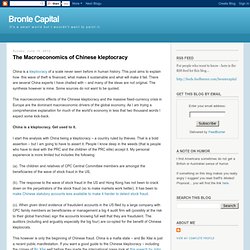
This post aims to explain how this wave of theft is financed, what makes it sustainable and what will make it fail. There are several China experts I have chatted with – and many of the ideas are not original. The synthesis however is mine. Some sources do not want to be quoted. The macroeconomic effects of the Chinese kleptocracy and the massive fixed-currency crisis in Europe are the dominant macroeconomic drivers of the global economy. China is a kleptocracy. I start this analysis with China being a kleptocracy – a country ruled by thieves. (a). (b). (c). This however is only the beginning of Chinese fraud. China has huge underlying economic growth from moving peasants into the modern economy Every economy that has moved peasants to an export-orientated manufacturing economy has had rapid economic growth. Follow up to the China kleptocracy post. The China kleptocracy post has received a lot of comment - mostly favourable.
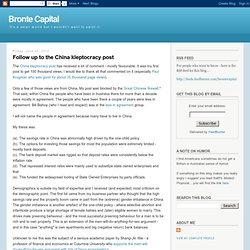
It was my first post to get 100 thousand views. I would like to thank all that commented on it (especially Paul Krugman who was good for about 35 thousand page views). Only a few of those views are from China. My post was blocked by the Great Chinese firewall.* That said, within China the people who have been in business there for more than a decade were mostly in agreement. The people who have been there a couple of years were less in agreement. I will not name the people in agreement because many have to live in China. My thesis was (a). Demographics is outside my field of expertise and I received (and expected) most criticism on the demographic point. Unknown to me this was the subject of a serious academic paper by Shang-Jin Wei - a professor of finance and economics at Columbia University who supports the men-will-do-anything-for-sex argument with lots of fancy econometrics.
John.
Down-Under Hypocrites Bet All on China’s Boom: William Pesek. All in.
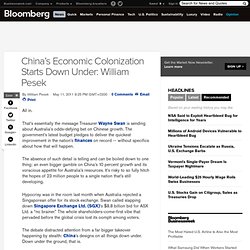
That’s essentially the message Treasurer Wayne Swan is sending about Australia’s odds-defying bet on Chinese growth. The government’s latest budget pledges to deliver the quickest improvement in the nation’s finances on record -- without specifics about how that will happen. The absence of such detail is telling and can be boiled down to one thing: an even bigger gamble on China’s 10 percent growth and its voracious appetite for Australia’s resources. It’s risky to so fully hitch the hopes of 23 million people to a single nation that’s still developing.
Hypocrisy was in the room last month when Australia rejected a Singaporean offer for its stock exchange. The debate distracted attention from a far bigger takeover happening by stealth: China’s designs on all things down under. The stock market deal would’ve been just a corporate merger, not exactly an affront to Australia’s national identity.
Resource Boom There’s even a role for Ben Bernanke. Two-Speed Economy 17th-Century Model.
Reverse mergers? Behind <i>The Rise of the Great Powers</i> China’s imprisoned Nobel Peace Prize winner asks what a TV miniseries can teach us about the direction of the new China.
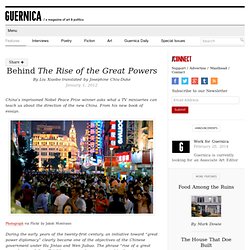
From his new book of essays. Photograph via Flickr by Jakob Montrasio During the early years of the twenty-first century, an initiative toward “great power diplomacy” clearly became one of the objectives of the Chinese government under Hu Jintao and Wen Jiabao. China coal.